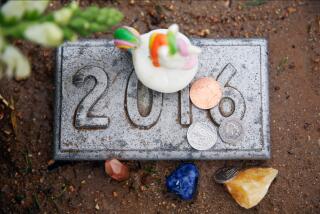Feeling lonely is a real pain
- Share via
Are you feeling lonely, disconnected or alienated? It could be making you sick, and, ironically, you’re not alone.
In 1985, when researchers asked a cross-section of Americans how many confidants they had, the most common response was three. When they asked again in 2004, the most common answer -- from 25% of respondents -- was zero, nil, nada.
In 1950, only 9.3% of American households consisted of people living alone. By 2000, that percentage had jumped to a whopping 26%.
Living alone doesn’t necessarily make you lonely. But it certainly doesn’t help. Individuals have varying levels of need for connection with others. But when your needs and your situation don’t match up, you may feel a little pang in your gut to go along with that unpleasant impression that you’re floating alone on a raft in the middle of the ocean. A pain. Literally.
And that’s a good thing, says University of Chicago neuroscientist John Cacioppo, who recently co-wrote a book called “Loneliness.” In the same way that physical pain helps protect you from physical danger, says Cacioppo, social pain evolved to help keep individuals from the dangers of social isolation. Just as the discomfort of scalded skin tells your brain to pull your hand away from boiling water, loneliness developed as a stimulus to get humans to pay more attention to the people around them and to reach out and touch someone.
There’s been a lot of talk in recent years about Americans losing their sense of social connectedness. But when we speak of the loss of civic engagement, we generally talk of its costs to our democracy and civil society. What Cacioppo is arguing is that social isolation, and the feelings of loneliness it can cause, don’t only hurt society at large, they carry physical dangers for individuals. As the ranks of the chronically lonely grow, it threatens to become a public health problem.
Physical aloneness is already a known problem. It can be as bad for your health as smoking or obesity. Isolation can lead to risky behavior, and the absence of friends, colleagues, neighbors, family or caregivers can have serious consequences, particularly for the aging. But in addition to the dangerous consequences of being alone, the bad feelings engendered by loneliness also can have detrimental effects on the body, and therefore hasten the aging process.
Here’s how it works: The empty feeling of loneliness is an alarm signal embedded in our genes that tells us when to reach out to others. It gives us a heightened sense of wariness and threat, and elicits a chain of physiological reactions that we know as the fight-or-flight response. Fight-or-flight creates increased resistance in our cardiovascular system and floods our bodies with hormones that pump us up. Long ago, these hormones helped our ancestors run from danger or fight it off. Today, however, in the absence of imminent attack by a saber-toothed tiger, these chemicals can be a corrosive force to the body.
In contemporary society, the fight-or-flight response may not be over quickly, the way an ancient physical threat would have been. We can suffer the same debilitating feelings of loneliness (or other kinds of high and constant stress) week after week, year after year, wearing down the body’s metabolism and muscular efficiency.
All of this means we need to take the problem of lagging civic engagement and growing social isolation out of the realm of the social sciences and put it in the physical sciences. We have to stop looking at declining civic participation as a primarily political problem that is solvable through increased activism. Although activism may increase participation, which in turn translates into less social isolation, it does not get to the deeper problem of the quality of connections we form with the people who surround us on a day-to-day basis.
As Cacioppo puts it, “If civic engagement is to contribute substantially to assuaging the problem of loneliness, then it cannot be something merely akin to networking at a trade show.”
Nature gave us a warning system that reminds us of the dangers of being isolated from our fellow man. Millions of alarm bells are ringing.
--
grodriguez@latimescolumnists.com






